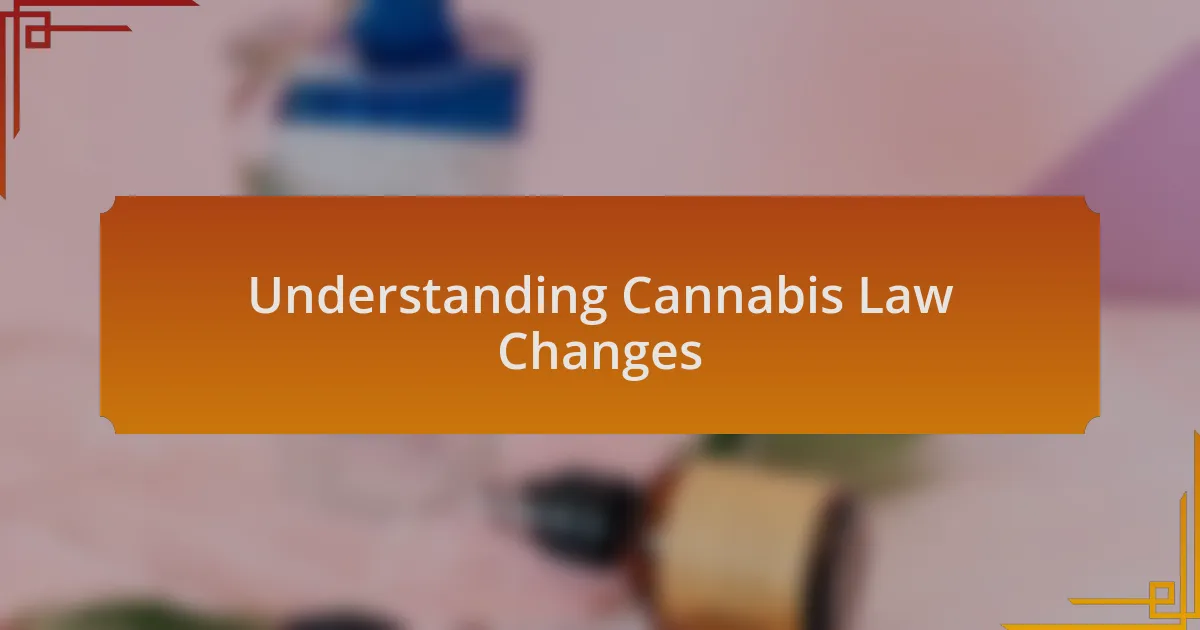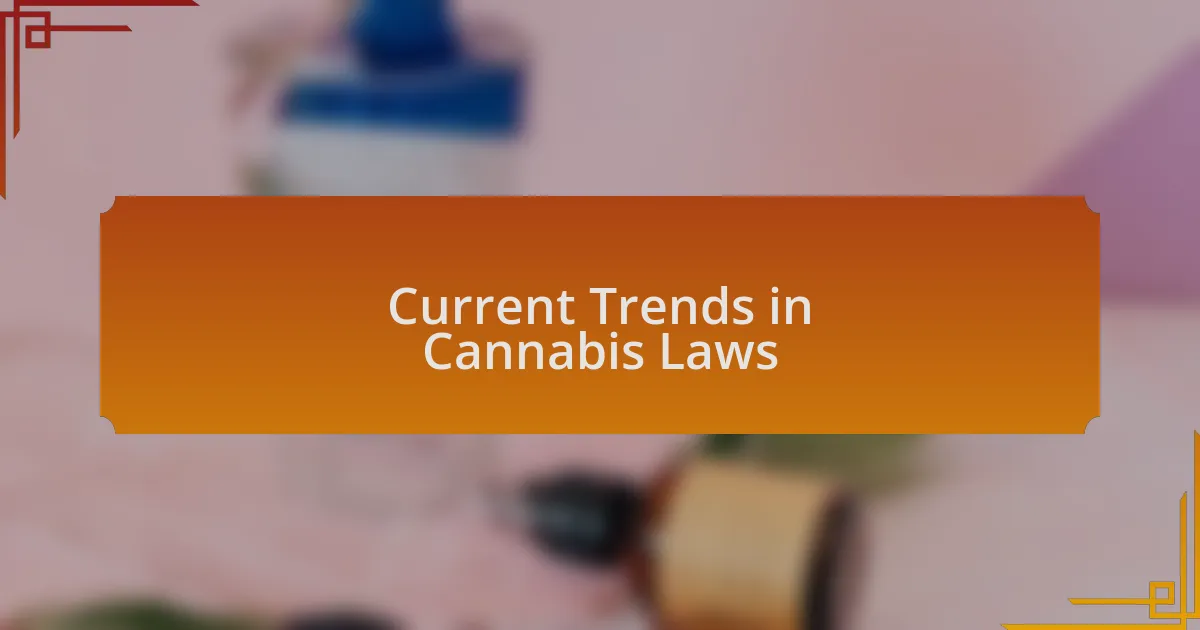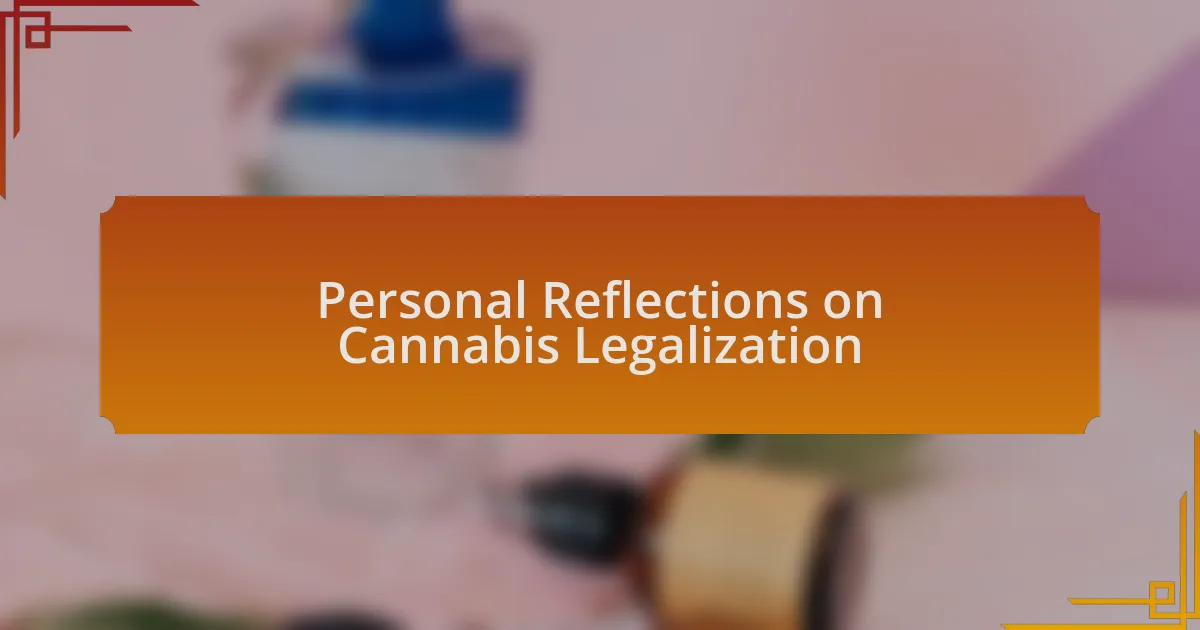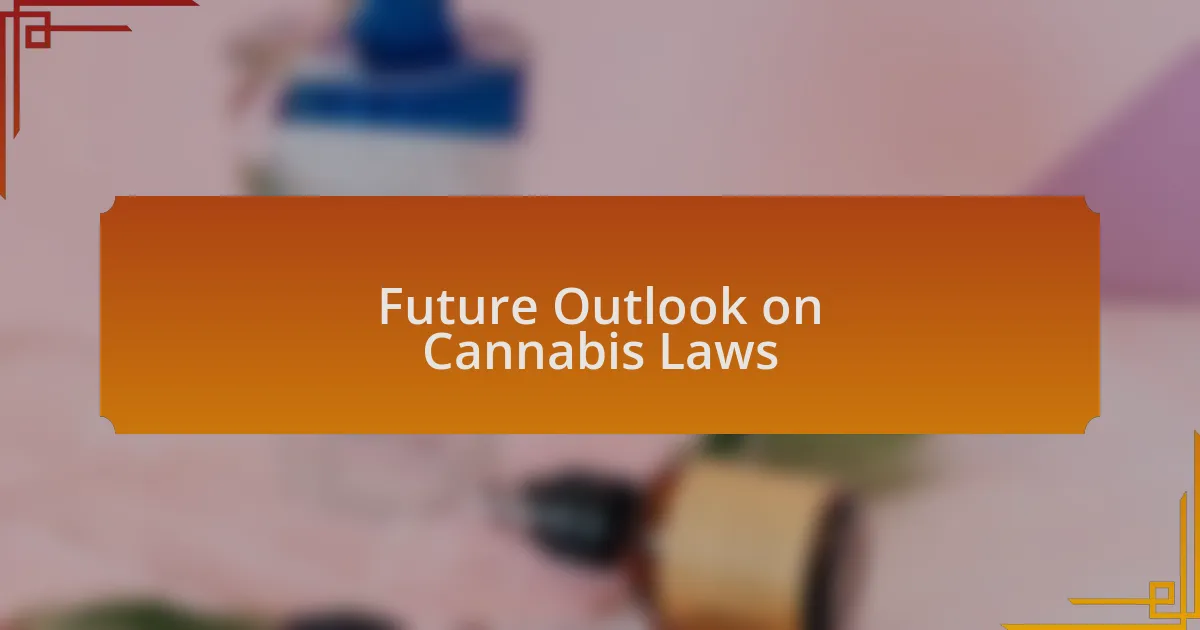Key takeaways:
- Society’s perception of cannabis has shifted from taboo to open discussion, leading to evolving laws and personal freedoms.
- The history of cannabis legislation reveals a journey from medical acceptance to criminalization and now towards decriminalization and legalization across various states.
- Current trends show increasing state-level embrace of cannabis, emphasizing economic benefits, social justice, and public health considerations.
- Future cannabis laws may prioritize education and social equity, promoting informed choices and rectifying past injustices in the industry.

Understanding Cannabis Law Changes
As I reflect on my journey with cannabis law changes, it strikes me how much society’s perception of this plant has evolved. I remember when discussing cannabis was almost taboo, often met with raised eyebrows and skepticism. It’s fascinating to see how legislative shifts now encourage open conversations, leading to a broader understanding of its benefits and potential risks.
Navigating the intricate landscape of cannabis laws is like piecing together a puzzle. Each state’s regulations differ, creating a maze of rules that can be overwhelming. I often wonder, how many people are aware of the vast impact these changes have on personal freedoms and economic landscapes? When laws shift, it isn’t just about legality; it’s about lives transformed by new opportunities in farming, business, and personal use.
While I keep track of these changes, I can’t help but feel a mix of excitement and concern. The evolving legality brings potential for healing and growth, but it also introduces complexities around social equity and public health. I often ask myself, are we fully prepared to address the challenges that come with increased accessibility? An informed community is essential, and understanding these laws can empower individuals to advocate for responsible practices and equitable policies.

The History of Cannabis Legislation
The history of cannabis legislation in the United States is both rich and complex. I remember learning about the early 20th century when cannabis was commonly used in medicine. It was a time when patent medicines often included cannabis extracts, and people viewed the plant as just another helpful remedy.
As the decades progressed, public sentiment shifted dramatically. I often find it striking how, in the 1930s, cannabis was demonized by campaigns that painted it as a dangerous substance, leading to the Marijuana Tax Act of 1937. This legislation effectively criminalized cannabis and marked the beginning of a long era of prohibition that many of us are still grappling with today.
The tide began to turn in the late 20th century, when states started re-evaluating cannabis laws. I recall the excitement when California legalized medical marijuana in 1996, paving the way for a nationwide dialogue on reform. It made me realize that change often starts with small victories, and these historic shifts have laid the groundwork for the more progressive legal landscape we see emerging now.

Current Trends in Cannabis Laws
Current trends in cannabis laws reflect a significant shift in public perception and governmental policy. Personally, I find it fascinating how more states are embracing both medical and recreational cannabis, often citing the economic benefits and tax revenue as strong motivators. Just last week, I came across a report highlighting how states that legalized cannabis saw a notable increase in job creation, and that really got me thinking about the broader implications for communities.
Moreover, the movement toward decriminalization is gaining traction, with cities and states opting to reduce penalties for cannabis possession. I remember discussing this topic with friends, and it struck me how much easier it is now for people to talk openly about cannabis without fear of legal repercussions. Isn’t it refreshing to see a shift that acknowledges the social justice aspect alongside public health considerations?
Another compelling trend is the push for federal legalization at the national level, with advocacy groups rallying for comprehensive reform. I often wonder how this could change the landscape of cannabis sales, especially with the possibility of regulations that ensure product safety. The anticipation around potential federal guidelines makes the policy landscape feel dynamic and full of promise, doesn’t it?

Personal Reflections on Cannabis Legalization
Thinking about cannabis legalization, I can’t help but reflect on how my own views have evolved over the years. I remember when I first learned about medical cannabis, I was skeptical. It felt like a leap into the unknown. However, witnessing its benefits for friends dealing with chronic pain opened my eyes to its potential.
When I see the conversations around legalization now, it feels like a breath of fresh air. I think back to the stigma I felt growing up; discussing cannabis was often taboo. Now, with changing laws, I find myself having meaningful dialogues with people from all walks of life. It’s fascinating how these discussions have shifted toward more educated perspectives on responsible use and the potential for healing.
I often think about the economic implications of legalization. Just last month, I attended a seminar where a local entrepreneur shared how legalization sparked his business. Hearing his passion as he described not just profits but community investments reminded me of the broader social change legalization can inspire. Isn’t it exciting to consider how these shifts can foster innovation and connection within our communities?

Potential Benefits of Cannabis Legalization
It’s hard to overlook the potential economic benefits of cannabis legalization. I recall a chat with a friend who started a cannabis-related venture. He shared how the emergence of a legal market opened doors for local farmers and entrepreneurs, boosting the economy in ways we hadn’t imagined. Can you picture an entire industry sprouting, creating jobs and stimulating growth in our communities?
Then there’s the aspect of reducing crime and strain on our legal systems. I remember feeling uneasy about the criminalization of something that many adults choose to use responsibly. Legalization can pave the way for law enforcement to focus on more pressing issues instead of petty cannabis-related offenses. The peace of mind that comes with knowing reasonable regulations are in place feels like a significant step forward.
The health benefits are another compelling angle I find encouraging. Recently, I attended a health fair where I met individuals sharing their experiences with cannabis as an alternative to opioids for pain management. Hearing their stories reinforced for me how important it is to have safe access to such a resource. Doesn’t it make sense that we should embrace options that can promote well-being while reducing dependence on more harmful substances?

Future Outlook on Cannabis Laws
It’s fascinating to consider how cannabis laws might continue to evolve in the coming years. I remember vividly a discussion I had with a policy advocate who passionately argued that public opinion is shifting not just in favor of legalization, but toward more progressive regulations that can enhance social equity. Could you imagine a future where the cannabis industry not only thrives but actively works to rectify past injustices?
As I reflect on this, it strikes me that education will play a crucial role in shaping the future landscape of cannabis laws. I recently went to a seminar focused on cannabis legislation, where experts discussed the importance of providing accurate information to dispel long-held myths. It got me thinking: isn’t it empowering to create a society where informed choices drive the conversation around cannabis rather than fear and stigma?
Looking ahead, I can’t help but feel optimistic about the possibilities. When I think about how countries like Canada have embraced change with comprehensive frameworks, it gives me hope that we can reach similar heights. What if the U.S. could unite on this issue, creating a robust network of regulations that prioritize safety, access, and respect for individual choice? That kind of unity could truly transform lives, and I eagerly await the day when that vision becomes a reality.